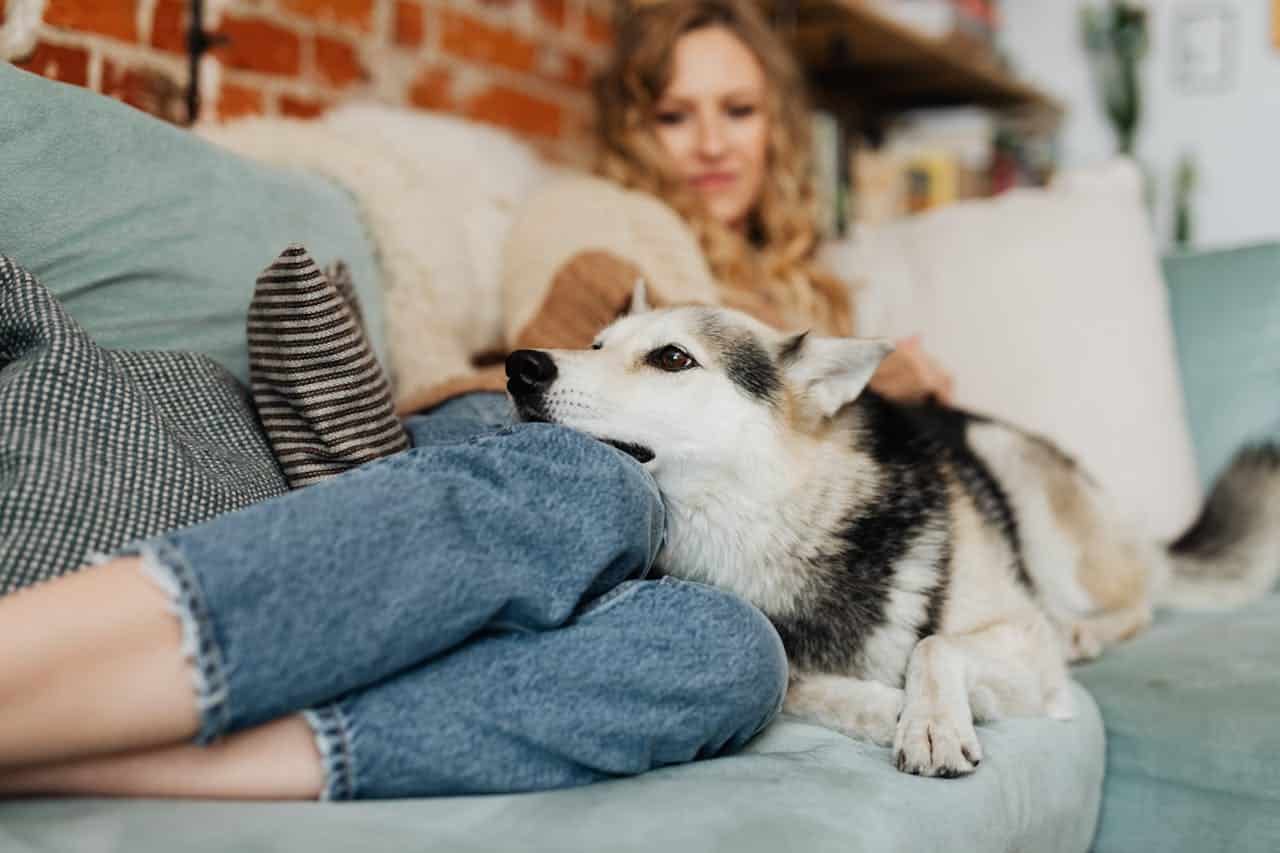Ladies, science has officially confirmed what many of you suspected all along: your furry friend makes a better sleeping companion than your human partner. Researchers at Canisius College surveyed 962 women across the United States and discovered something that might make men everywhere reconsider their bedtime behavior. Women who sleep with dogs report better sleep quality, less disruption, and stronger feelings of comfort and security compared to those sleeping with human partners. Published research shows that 55% of participants shared their beds with dogs, while 57% slept with human companions—and guess which group felt more rested?
Dogs Win the Sleep Quality Competition
Survey results paint a clear picture: dogs outperform human partners when it comes to nighttime companionship. Women consistently reported that dogs caused less sleep disruption compared to their human bedmates, who toss, turn, snore, and steal covers more than our canine friends.
Dogs naturally sync with human sleep patterns better than people do with each other. Unlike humans, who may have different sleep schedules, preferred room temperatures, or bedtime routines, dogs adapt to their owners’ patterns. They don’t check phones, watch late-night television, or engage in conversations that keep you awake.
Participants described feeling more comfortable and secure with dogs nearby during sleep hours. Unlike human partners who might get up during the night, leave early for work, or travel frequently, dogs provide a consistent presence that promotes feelings of safety and relaxation.
Research data showed that women sleeping with dogs experienced fewer interruptions throughout the night. Dogs don’t kick, elbow, or accidentally wake their sleeping partners like humans often do. Once settled, most dogs remain relatively still and quiet until morning.
Why Four Legs Beat Two for Bedtime
Dogs offer several advantages over human sleeping partners that contribute to better rest quality. First, dogs maintain more consistent body temperatures throughout the night, providing steady warmth without the overheating that often occurs when sleeping next to another person.
Canine sleeping positions tend to be less disruptive than human movements. Dogs typically curl up in specific spots and stay there, unlike humans, who shift positions frequently during sleep cycles. Most dogs instinctively avoid disturbing their owners once they’ve found a comfortable position.
Dogs don’t bring emotional baggage or relationship stress into the bedroom. Unlike human relationships that sometimes involve bedtime arguments, work discussions, or intimacy pressures, dogs offer unconditional companionship without complex emotional dynamics that can interfere with relaxation.
Breathing patterns of dogs can promote better sleep in humans. Regular, rhythmic dog breathing often has a calming effect similar to white noise machines, helping mask disruptive environmental sounds that might otherwise wake sleeping owners.
Cats Fall Short of Canine Standards
While cats also share beds with their owners, survey results showed they don’t provide the same sleep benefits as dogs. Women reported that cats were equally as disruptive as human partners, moving around more during the night and showing less consideration for their sleeping owners.
Cats scored lower on comfort and security measures compared to both dogs and human partners. Unlike dogs, who tend to be protective and alert to household sounds, cats often ignore potential disturbances, providing less sense of security during vulnerable sleeping hours.
Feline sleep schedules don’t align well with human patterns. Cats are naturally crepuscular, meaning they’re most active during dawn and dusk hours when humans prefer to sleep. Cat owners frequently reported being awakened by nighttime play sessions or early morning demands for attention.
Cat behavior in bed tends to be more self-serving than accommodating. While dogs often adjust their sleeping positions to avoid disturbing owners, cats choose locations based purely on their comfort, sometimes sleeping on or across their human companions regardless of convenience.
Science Behind Pet-Enhanced Sleep
Research reveals several biological mechanisms that explain why sleeping with pets, particularly dogs, improves rest quality. Physical contact with beloved animals triggers oxytocin release, a hormone that promotes relaxation and reduces stress levels naturally.
Dogs provide a sense of security that activates the parasympathetic nervous system, which controls rest-and-digest functions. When women feel safe and protected, their bodies can more easily enter deep sleep phases necessary for physical and mental restoration.
Regular sleep schedules benefit overall health, and dog ownership naturally promotes consistent bedtime routines. Dogs need regular walks and feeding times, creating a structure that supports healthy circadian rhythms in their owners.
Reduced anxiety levels contribute significantly to improved sleep quality. Many women report feeling less anxious about household security when their dog sleeps nearby, knowing their pet will alert them to any unusual sounds or disturbances.
Dog Ownership Creates Healthier Sleep Habits
Survey data revealed that dog owners maintain earlier bedtimes and wake times compared to cat owners or those without pets. Dog walking requirements encourage owners to establish regular schedules that support natural sleep-wake cycles.
Morning dog walks provide early sunlight exposure that helps regulate circadian rhythms. Exposure to natural light shortly after waking signals the brain to suppress melatonin production and increase alertness, promoting better sleep quality the following night.
Evening dog care routines create natural wind-down periods that prepare the body for sleep. Walking dogs before bedtime, providing final meals, and settling them for the night establishes calming pre-sleep rituals that benefit both pets and owners.
Dog ownership often reduces screen time before bed since owners spend time caring for their pets instead of scrolling phones or watching television. Reduced blue light exposure in evening hours supports natural melatonin production for better sleep quality.
Security and Comfort Drive Better Rest
Women consistently reported stronger feelings of safety when sleeping with dogs compared to sleeping alone or with human partners. Dogs naturally remain alert to sounds and movements even while resting, providing a security system that allows owners to relax completely.
Emotional comfort from pet companionship reduces cortisol levels that can interfere with sleep quality. Unlike human relationships that sometimes involve stress or conflict, relationships with dogs typically provide uncomplicated emotional support that promotes relaxation.
Physical warmth from dog contact helps maintain optimal body temperature for sleep without overheating. Dogs naturally regulate their position to provide comfortable warmth while avoiding the excessive heat that can disrupt sleep when sharing beds with humans.
The routine presence of a beloved pet creates psychological comfort that makes falling asleep easier. Unlike human partners who may travel or have different schedules, dogs provide consistent companionship that reduces bedtime anxiety and loneliness.
Relationship Implications Worth Considering
Before human partners feel completely defeated by these findings, it’s important to note that relationships involve much more than sleeping arrangements. Dogs excel at providing comfort and security during rest hours, but they can’t offer emotional intimacy, conversation, or partnership support that humans provide.
Many couples find compromises that work for everyone, including four-legged family members. Some allow dogs in the bedroom but not on the bed, while others designate specific sleeping areas that accommodate both human and canine comfort needs.
Communication between partners about sleep preferences can address many issues that make dogs seem like better bedmates. Discussing temperature preferences, movement patterns, and bedtime routines often resolves problems that interfere with quality rest.
Sleep quality affects relationship satisfaction, so finding arrangements that promote good rest for both partners benefits overall relationship health. Whether that includes dogs in the bed or separate sleeping spaces depends on individual preferences and circumstances.
My Personal RX on Pets and Sleep Quality
Having spent decades studying how lifestyle factors affect health outcomes, I find these sleep study results fascinating because they highlight often-overlooked connections between companion animals and human wellness. Good sleep quality is essential for immune function, mental health, and overall vitality, so understanding factors that promote better rest deserves serious attention from both patients and healthcare providers.
- Evaluate your current sleep quality objectively: Track sleep patterns, energy levels, and daytime alertness to determine whether your current sleeping arrangements support optimal rest and recovery.
- Support overall sleep health through targeted nutrition: Consider MindBiotic supplements that provide gut-brain support, as the microbiome influences sleep quality through neurotransmitter production and stress hormone regulation.
- Create consistent bedtime routines regardless of sleeping partners: Establish calming pre-sleep activities like gentle stretching, reading, or meditation that signal your body to prepare for rest.
- Prepare sleep-promoting foods from anti-inflammatory recipes: Use Mindful Meals cookbook to make evening meals that support natural melatonin production and avoid foods that can disrupt sleep quality.
- Consider pet allergies and respiratory health: Ensure sleeping with animals doesn’t compromise breathing quality, especially if you have asthma or allergies that could worsen with close pet contact.
- Maintain sleep hygiene standards with pets present: Keep bedding clean, ensure adequate space for comfortable movement, and address any hygiene issues that could affect sleep environment quality.
- Balance emotional benefits with practical sleep needs: Weigh feelings of comfort and security from pet companionship against potential sleep disruptions to find arrangements that optimize both emotional and physical rest.
- Address underlying sleep disorders professionally: If sleep problems persist despite comfortable arrangements, consult healthcare providers to rule out sleep apnea, restless leg syndrome, or other medical conditions.
- Communicate openly about household sleeping preferences: Discuss comfort levels, boundaries, and concerns with family members to create sleeping arrangements that work for everyone involved.
- Prioritize sleep quality as a health foundation: Remember that consistent, restorative sleep supports immune function, mental clarity, and emotional stability regardless of who or what shares your bed.
Sources:
Krahn, L. E., Tovar, M. D., & Miller, B. (2015). Are pets in the bedroom a problem? Mayo Clinic Proceedings, 90(12), 1663–1665. https://doi.org/10.1016/j.mayocp.2015.08.012
Medlin, K., & Wisnieski, L. (2023). The association of pet ownership and sleep quality and sleep disorders in United States adults. Human-Animal Interactions. https://doi.org/10.1079/hai.2023.0005











 Subscribe to Ask Dr. Nandi YouTube Channel
Subscribe to Ask Dr. Nandi YouTube Channel









